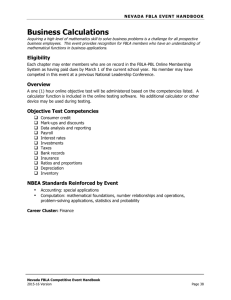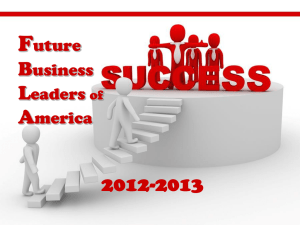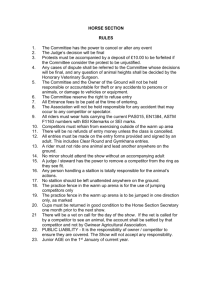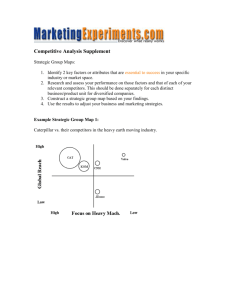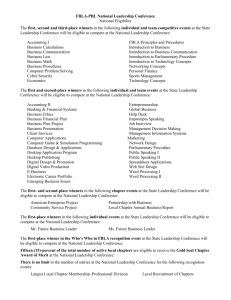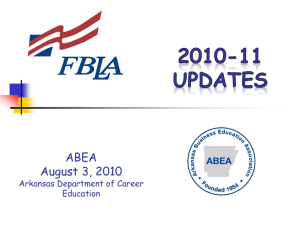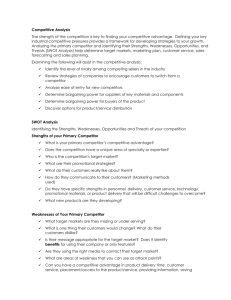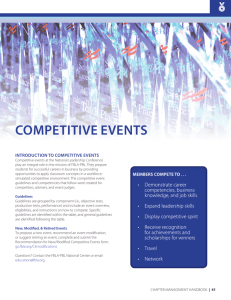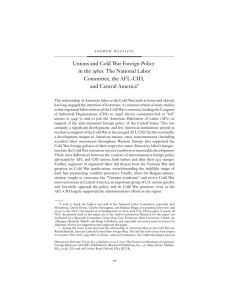GenerAL event GuideLines BUSINESS CALCULATIONS
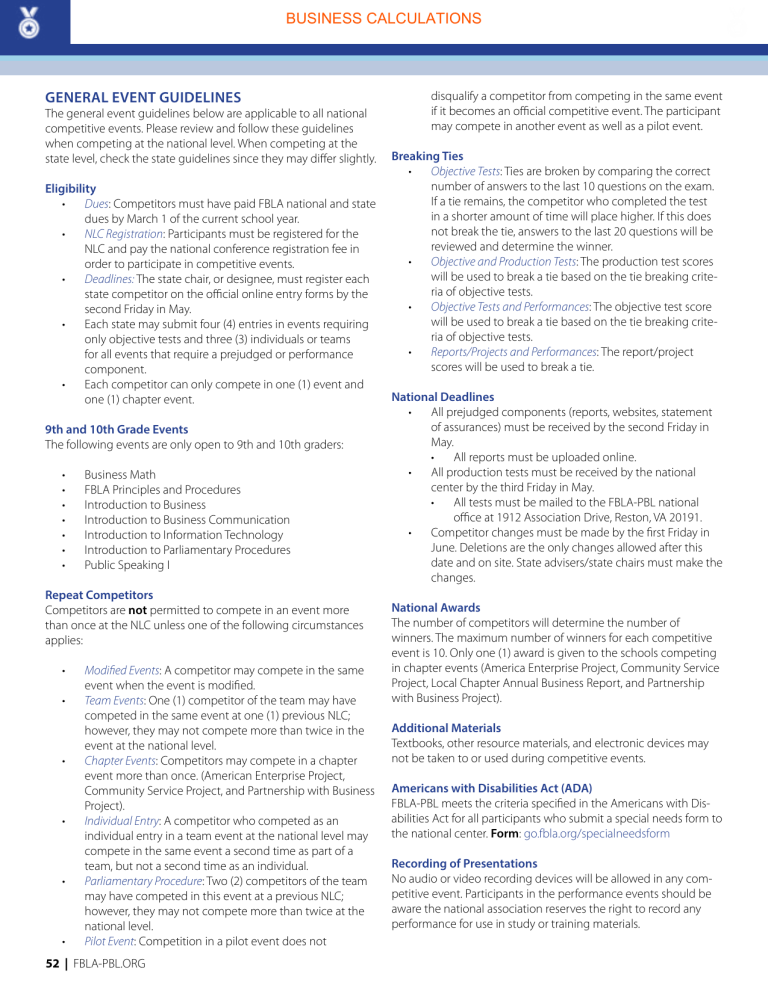
BUSINESS CALCULATIONS
GenerAL event GuideLines
The general event guidelines below are applicable to all national competitive events. Please review and follow these guidelines when competing at the national level. When competing at the state level, check the state guidelines since they may differ slightly.
disqualify a competitor from competing in the same event if it becomes an official competitive event. The participant may compete in another event as well as a pilot event.
eligibility
• Dues : Competitors must have paid FBLA national and state dues by March 1 of the current school year.
• NLC Registration : Participants must be registered for the
NLC and pay the national conference registration fee in order to participate in competitive events.
• Deadlines: The state chair, or designee, must register each state competitor on the official online entry forms by the second Friday in May.
• Each state may submit four (4) entries in events requiring only objective tests and three (3) individuals or teams for all events that require a prejudged or performance component.
• Each competitor can only compete in one (1) event and one (1) chapter event.
Breaking ties
• Objective Tests : Ties are broken by comparing the correct number of answers to the last 10 questions on the exam.
If a tie remains, the competitor who completed the test in a shorter amount of time will place higher. If this does not break the tie, answers to the last 20 questions will be reviewed and determine the winner.
• Objective and Production Tests : The production test scores will be used to break a tie based on the tie breaking criteria of objective tests.
• Objective Tests and Performances : The objective test score will be used to break a tie based on the tie breaking criteria of objective tests.
• Reports/Projects and Performances : The report/project scores will be used to break a tie.
9th and 10th Grade events
•
•
•
•
•
•
•
Business Math
FBLA Principles and Procedures
Introduction to Business
Introduction to Business Communication
Introduction to Information Technology
Introduction to Parliamentary Procedures
Public Speaking I
The following events are only open to 9th and 10th graders: national deadlines
• All prejudged components (reports, websites, statement of assurances) must be received by the second Friday in
May.
• All reports must be uploaded online.
• All production tests must be received by the national center by the third Friday in May.
• All tests must be mailed to the FBLA-PBL national office at 1912 Association Drive, Reston, VA 20191.
• Competitor changes must be made by the first Friday in
June. Deletions are the only changes allowed after this date and on site. State advisers/state chairs must make the changes.
repeat Competitors
Competitors are not permitted to compete in an event more than once at the NLC unless one of the following circumstances applies: national Awards
The number of competitors will determine the number of winners. The maximum number of winners for each competitive event is 10. Only one (1) award is given to the schools competing in chapter events (America Enterprise Project, Community Service
Project, Local Chapter Annual Business Report, and Partnership with Business Project).
• Modified Events : A competitor may compete in the same event when the event is modified.
• Team Events : One (1) competitor of the team may have competed in the same event at one (1) previous NLC; however, they may not compete more than twice in the event at the national level.
• Chapter Events : Competitors may compete in a chapter event more than once. (American Enterprise Project,
Community Service Project, and Partnership with Business
Project).
• Individual Entry : A competitor who competed as an individual entry in a team event at the national level may compete in the same event a second time as part of a team, but not a second time as an individual.
• Parliamentary Procedure : Two (2) competitors of the team may have competed in this event at a previous NLC; however, they may not compete more than twice at the national level.
• Pilot Event : Competition in a pilot event does not
52 | FBLA-PBL.ORG
Additional materials
Textbooks, other resource materials, and electronic devices may not be taken to or used during competitive events.
Americans with disabilities Act (AdA)
FBLA-PBL meets the criteria specified in the Americans with Disabilities Act for all participants who submit a special needs form to the national center. Form : go.fbla.org/specialneedsform recording of presentations
No audio or video recording devices will be allowed in any competitive event. Participants in the performance events should be aware the national association reserves the right to record any performance for use in study or training materials.
oBJeCtive test events & CompetenCies
overview
These events consist of a 60-minute test, administered during the
National Leadership Conference (NLC).
eligibility
Each state may submit four (4) individuals. Competitors must have paid FBLA national and state dues by March 1 of the current school year. event name
Accounting i
Agribusiness
*see next page
Business Calculations
Business Communication
Business Law
Business math
9th & 10th graders
Business procedures
Computer problem solving
Cyber security economics
FBLA principles & procedures
9th & 10th graders health Care Administration insurance & risk management nLC registration
Participants must be registered for the NLC and pay the national conference registration fee in order to participate in competitive events.
objective test Guidelines
• No materials may be brought to the testing site.
• No calculators may be brought into the testing site; calculators will be provided.
• Electronic devices must be turned off and out of sight.
• Bring a writing instrument.
objective test Competencies
Journalizing | account classification | terminology | concepts and practices | types of ownership | posting | income statements | balance sheets | worksheets | bank reconciliations | payroll | depreciation | manual and computerized systems | ethics
Economics | finance and accounting | health, safety and environmental management | management analysis and decision making | marketing | terminology and trends
Consumer credit | mark-up and discounts | data analysis and reporting | payroll | interest rates | investments | taxes | bank records | insurance | ratios and proportions | depreciation | inventory
Nonverbal and verbal communication | communication concepts | report application | grammar | reading comprehension | editing and proofreading | word definition and usage | capitalization and punctuation | spelling | digital communication
Legal systems | contracts and sales | business organization | property laws | agency and employment laws | negotiable instruments, insurance secured transactions, bankruptcy | consumer protection and product/personal liability | computer law | domestic and private law
Basic math concepts | consumer credit | data analysis | probability | fractions | percentages | discounts | decimals
Human relations | technology concepts | business operations | communication skills | information processing | decision making/management | career development | database and information management | ethics and safety | finance
Operating systems | networks | personal computer components | security | safety and environmental issues | laptop and portable devices | printers and scanners
Defend and attack (virus, spam, spyware) | network security | disaster recovery | email security | intrusion detection | authentication | public key | physical security | cryptography | forensics security | cyber security policy
Basic economic concepts and principles | monetary and fiscal policy | productivity | macroeconomics | market structures | investments and interest rates | government role | types of businesses/economic institutions | business cycles/circular flow | supply and demand | international trade/global economics
FBLA organization | bylaws and handbook | national competitive events guidelines | national publications | creed and national goals
Managing office procedures | medical terminology | legal and ethical issues | communication skills | managing financial functions | health insurance | records management | infection control | medical history | technology
Risk management process | property and liability insurance | health, disability, and life insurance | insurance knowledge | decision making | careers | ethics
54 | FBLA-PBL.ORG
